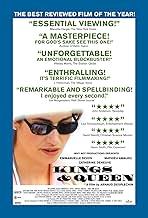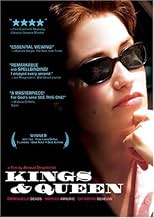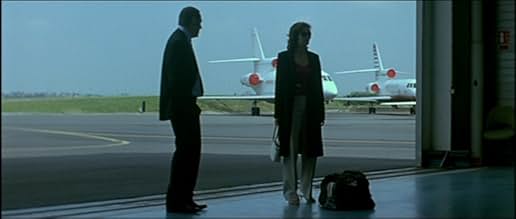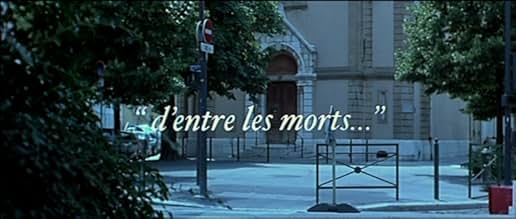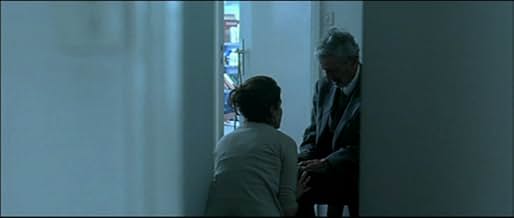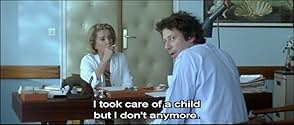Füge eine Handlung in deiner Sprache hinzuParallel storylines tell the current state of affairs for two ex-lovers: Nora's a single mother who comes to care for her terminally ill father; holed in up in mental ward, Ismael, a brillia... Alles lesenParallel storylines tell the current state of affairs for two ex-lovers: Nora's a single mother who comes to care for her terminally ill father; holed in up in mental ward, Ismael, a brilliant musician, plots his escape.Parallel storylines tell the current state of affairs for two ex-lovers: Nora's a single mother who comes to care for her terminally ill father; holed in up in mental ward, Ismael, a brilliant musician, plots his escape.
- Regie
- Drehbuch
- Hauptbesetzung
- Auszeichnungen
- 9 Gewinne & 18 Nominierungen insgesamt
Empfohlene Bewertungen
Our first impressions of each parallel character who seems to have no relation with any other character undergo a complete turn-around by the time we have finished circling around them in time and space at the end of the film, especially as we begin to realize they are unreliable, self-serving narrators of their own experiences.
Each person is part of a very modern blended family, both by genetics and selection, and faces the most quotidian of life cycle decisions -- life, birth, marriage, paying bills, parent/child responsibilities, Laingian sanity and particularly death -- and makes a different choice how to handle them, whether active or passive, peremptorily or as fate.
But each choice leads them to the next unexpected plateau of choices with guilt hanging on each move. For each, doing the right thing means something completely different as each responds differently to an emotional and physical crisis.
Though psychoanalysis is drolly mocked as just another philosophy, each character may be eccentric or seriously crazy and undergoes Freudian traumatizations by family in casually cruel ways that alternate between funny and shocking (and sometimes absurd).
Director/co-writer Arnaud Desplechin revels in the diversity of his characters, so that as their orbits collide they can hardly communicate because their frames of reference are so different.
The acting brilliantly matches the unexpected revelations that flash back to let us know how each character got to be this person and the transformations to where they are going. Emmanuelle Devos as "Nora" lusciously fills the screen even as we find that her nonchalant beauty masks the devastation she leaves in her wake as it helps her use others for her selfish needs.
Desplechin has frequently cited Woody Allen as an influence (and "Seinfeld"), and Mathieu Amalric's Ismaël is a tribute to that talkative, intellectual Jewish persona and Philip Roth is mentioned as well, though this character is much more up on hip pop music and surprisingly matures as he gains far more humanity than his New York inspirations.
The film is long and slow, but curiosity about how each character got to where the film started is involving.
It's impossible to keep up with all the erudite references to poetry (Desplechin says the title comes from a chess metaphor in a French poem: "King without kingdom/ Queen without a scene/ Castle broken/ Bishop betrayed/ Fool as a brave man"), literature, mythology, art, music and film ("Moon River" seems to be used frequently these days).
Eric Gautier's cinematography is sensual and is particularly dreamy when an awful event occurs.
The production design creates illustrative environments for each person and family, as every object around each character has ironic counterpoint to the dialog.
The soundtrack eclectically extends from electronica to klezmer to hip hop to singer/songwriters Paul Weller and Randy Newman to classical and more that reflect the characters' psychological mise en scenes.
There's a lot of play with psychoanalysis (highlighted by Catherine Denueve in a bit part as a psychiatrist) that is fun and illuminating to watch. There's speckles of romance, dark humor, nihilism, magic realism, and soap opera theatrics with lots of references to philosophy, mythology, and poetry that keep the film interesting and unpredictable even as its over two and a half hour run time tries your patience. There are plenty of revelations and big emotional payoffs here punctuated well with eclectic music choices (everything from classical pieces to some sort of catchy European hip-hop) and nice little surprises (Magalie Woch is delightful as the lovely suicidal mental patient who becomes smitten with Ismael). This utterly French film gives the viewer a lot to chew on, even if you have to gnaw through a bit of gristle before dining on the filet mignon.
At any rate, this is a complex film that seems to have a lot of influences, mainly mythological and even it has shades of Shakespeare's King Lear. At two hours and forty minutes in length, the film could have used some badly needed trimming. It appears M. Desplechin don't know when to cut some of the things one sees in different sequences that could have been helped with the principle that "less is more".
One thing the director can't be blamed for is the wonderful performances he gets from all his actors, especially, the luminous Emmanuelle Devos, who does an amazing work portraying Nora, the woman at the center of the story. Also good, Mathieu Amalric, who is Ismael, the man that connects a lot of different points to the story. Maurice Garrel, as Nora's dying father is compelling. Valentin Legong as little Elias is also a great asset.
Let's hope M. Desplechin new venture will be a bit tighter in his future work.
Secondary characters in this overwritten but always entertaining drama make themselves hard to forget though buffoonery in the case of the Ismaël's junkie lawyer (Hypolytte Girardot); though their neediness, in the case of Arielle, "la Chinoise" a flirtatious 'princess' at the psych hospital, (Magalie Woch) or Nora's sister down-and-out Chloé, (Nathalie Boutefeu); bitchiness in the case of Ismaë's sister. Ismaël's usual shrink is a huge African grande dame; he gets his entrance exam and his walking papers at the hospital from none other than Catherine Deneuve (whose iciness and soulfulness would be an unforgettable blend even if she were not already one of the world's most beautiful sixty-somethings). The women are goddesses, bitches, or queens. Ismaël says women have no souls; but the story's main men are talented but narcissistic problem children. Elias seems poised to grow up into one of those too. Most of the acting is remarkable, or at the very least arresting. The mercurial Amalric and lovely Devos completely live up to their top billing. Still, even their parts might have done with some trimming back.
The movie comes with allusions to Leda and the Swan, Nietsche, Yeats, Emily Dickenson, and a large number of musical references including rap (and a break dancing demo by Ismaël at the mental hospital), Klezmer, Randy Newman and, as a framing device, Moon River. Suspicions that there may be too much going on here are stifled by sheer pleasure in the drama of it all.
Six César nominations in France, where it opened in late 2004.
The title may refer to Shakespeare's plays, or to the way paterfamilias are seen by their children. "Kings and Queen" is wildly unedited and at 2 ½ hours definitely too long; Desplechin even acknowledged repeatedly that his answers to questions after the SFFF showing were too long too. But his inability to edit his work down may be hard to separate from his unique flavor and charm. Desplechin wrote the excellent screenplay for "Un monde sans pitié" ("A World Without Pity," 1989) the story of a fascinating young loser. "Desplechin is a wonder with actresses, at least as long as they're with him: Devos' character is close enough to 'My Sex Life' star and former Desplechin paramour Mariane Denicourt that she responded to the movie with a retaliatory roman à clef," writes Sam Adams in the Philadelphia City Paper. A question about this contretemps met with a flurry of interesting doubletalk from the soft-spoken director.
Wusstest du schon
- WissenswertesThe title of the movie was inspired to Arnaud Desplechin by the five first lines of a poem by Michel Leiris: "Rois sans arrois Reine sans arène Tour trouée Fou à lier Cavalier seul"
- Zitate
Nora Cotterelle: There are four men I loved. I killed two of them.
- VerbindungenReferenced in Liebe ist Nervensache (2005)
- SoundtracksPavane pour une Infante défunte
Composed by Maurice Ravel
Top-Auswahl
- How long is Kings & Queen?Powered by Alexa
Details
- Erscheinungsdatum
- Herkunftsland
- Offizielle Standorte
- Sprachen
- Auch bekannt als
- Kings & Queen
- Drehorte
- Produktionsfirmen
- Weitere beteiligte Unternehmen bei IMDbPro anzeigen
Box Office
- Budget
- 3.871.153 € (geschätzt)
- Bruttoertrag in den USA und Kanada
- 290.973 $
- Eröffnungswochenende in den USA und in Kanada
- 16.101 $
- 15. Mai 2005
- Weltweiter Bruttoertrag
- 3.839.556 $
- Laufzeit2 Stunden 30 Minuten
- Farbe
- Sound-Mix
- Seitenverhältnis
- 2.35 : 1

